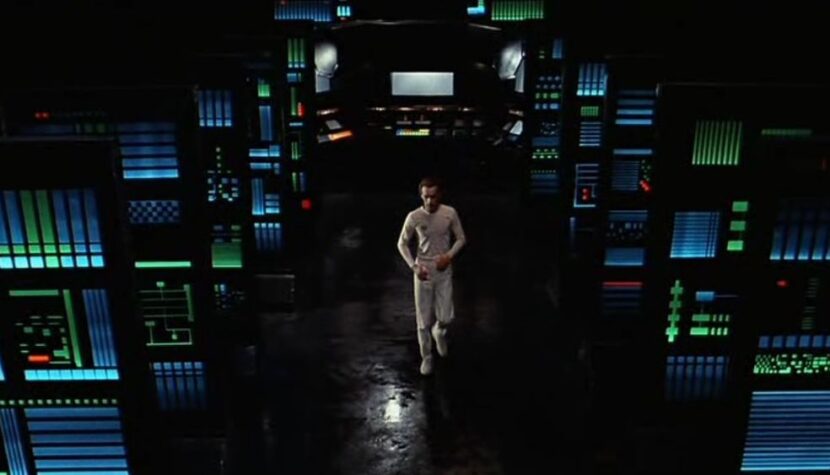ANDROID. Forgotten Science Fiction about Artificial Intelligence

Android received four nominations for various awards (including the prestigious Saturn Award), and the Australian newspaper “The Age” declared it the best science fiction film of A.D. 1982.
It is the year 2036. On a distant space station, Dr. Daniel lives and works with his assistant Max 404. Dr. Daniel is a brilliant scientist and inventor, a constructor of androids indistinguishable from humans, and Max is his most perfect creation so far. The five-year-old robot with the physical features of an adult man and the mentality of a child doesn’t have much to do on the station, so he spends his time studying human customs and Earth culture: watching old movies (including Fritz Lang’s Metropolis and Frank Capra’s It’s a Wonderful Life), listening to old hits, playing video games, and delving into the secrets of human sexuality. Meanwhile, Dr. Daniel tries to complete his latest creation, a female android named Cassandra, despite the prohibition imposed by the authorities who outlawed artificial life after the bloody robot rebellion in Munich. The only thing the scientist needs to activate Cassandra is the presence of a real woman. By twist of fate, three wanted criminals, including the beautiful Maggie, end up on the space station, and Max falls in love with her. It turns out that Dr. Daniel’s intentions are far from noble.

Android was created under the auspices of New World Pictures, founded by brothers Gene and Roger Corman, specializing in low-budget productions aimed at quick profits. One of Roger Corman’s modus operandi was the recycling of props, set designs, scenes, crew members, and even actors. In practice, this meant that various films were often produced by the same people and in the same sets. Android “inherited” sets and part of the executive staff from other NWP films, including James Cameron, who was working for Corman as a model maker at the time. Therefore, it’s not surprising that the filming of Lipstadt’s debut film lasted only four weeks, editing took three weeks, and production costs did not exceed one million dollars. However, when Android hit US screens and did not bring the expected profits, Corman lost interest and sold the rights to producers Rupert Harvey and Barry Opper; the latter was the brother of Don Keith Oppera, the co-screenwriter of Android and the actor playing the role of Max the android.
Max, as interpreted by Opper, is a bit of Charlie Chaplin, a bit of Buster Keaton: clumsy, naive, and somewhat foolish, a skinny guy full of good intentions that both the criminals who arrive at the station and Dr. Daniel skillfully exploit. The demonic scientist is one of many villainous roles in Klaus Kinski’s gallery, stealing every scene. On the other hand, the actors who played the fugitives – Brie Howard, Norbert Weisser, and Crofton Hardester – stay within the average of a B-movie, to which Android often comes close but miraculously never crosses. The film is undoubtedly cheap but not tacky (the excellent initial sequence realized in stop-motion animation in the spirit of Jan Švankmajer is noteworthy); inconsistent but not foolish; alternately serious and farcical; quite original and at the same time full of plays with the science fiction convention and references to pop culture; partly a tribute to Metropolis, partly a parody of Frankenstein (also The Bride of Frankenstein); a bit of a space opera with laser guns, a bit of drama addressing ethical and philosophical issues, and a bit of a coming-of-age story.

The latter subplot is the most interesting, or at least the most strongly outlined. Max, having discovered the human element within himself, undergoes a painful initiation journey – from a trusting child to a disillusioned adult who achieves his goals through deceit, murder, and betrayal. Not without reason, one critic wrote that Aaron Lipstadt’s film is “something like Rebel Without a Cause in a science fiction version, a fantasy about children rebelling against their parents. In this case, the children are androids, and the parent is a mad scientist” [1]. Max lives in a closed, safe (until a certain point) greenhouse environment, and he only has old movies, recordings, and games at his disposal. When the android learns the truth about his “father” and rebels against him and his “sister” in the clever final scene, he willingly wants to leave this artificial paradise. Perhaps the associations with the Bible are exaggerated in the case of low-budget American science fiction, but they arise naturally during the viewing of Android – a strange film in which one can find a lineage with films like Ex Machina (2014) by Alex Garland.

